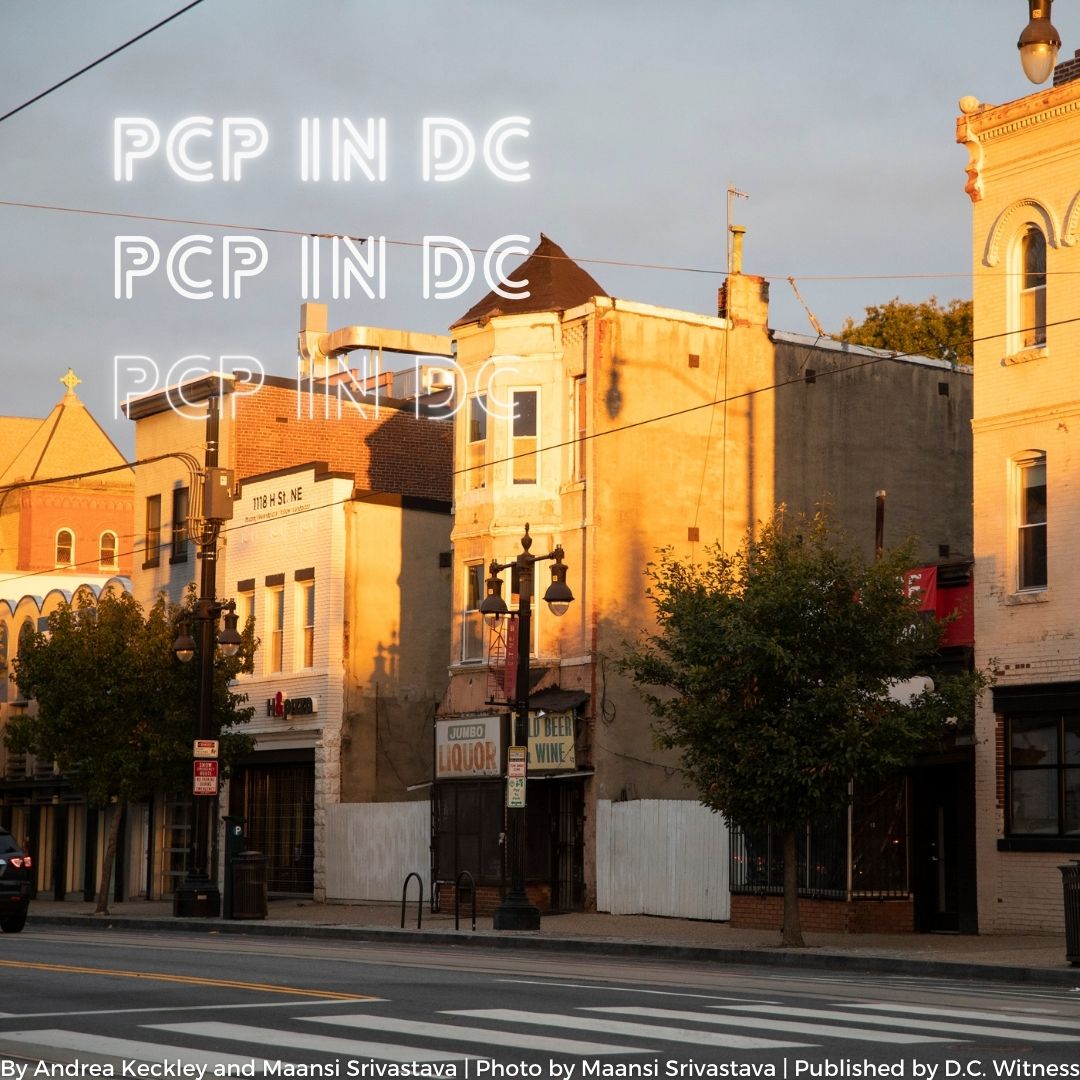
Thank you for reading D.C. Witness. Help us continue our mission into 2024.
Donate NowBy
Andrea Keckley [former]
- March 30, 2021
Featured
|
Infographics
|
Videos
|
John Littlejohn says he’ll never forget the Saturday night he sat on a church’s steps high on PCP.
“The police were making patrols in the neighborhood,” he recalls. “I was a dealer and a user.”
This was the early 1980s, when abuse of this powerful hallucinogen was reportedly rising in cities including DC.
And the drug has not lost its impact on the city’s criminal justice system, as many were reminded in 2015 when a woman in her thirties was fatally struck by a pick-up truck. The driver allegedly tested positive for PCP.
In fact, Commander John Haines of the Metropolitan Police Department’s (MPD) Narcotics and Special Investigations Division (NSID) said it is not uncommon to come across PCP daily in the District when D.C. Witness spoke to him last year.
As for Littlejohn, he went back to that church the next Sunday. And he kept going. And he kept dealing.
“I was asking the priest to help me – stop me from dealing,” he said. “But the habit was so large, I couldn’t get rid of it.”
Littlejohn was eventually arrested for possession of PCP.
The year was 1983. He found himself facing 15 to 30 years in prison. However, the judge gave him two years of probation instead.
Littlejohn says the police saved his life the day they arrested him. He says it was the last day he ever dealt. He has since been able to get sober and have the charge taken off his record.
“I carry my bible, you know?” he said. “I knew the road was going to be long and the road was going to be tough.”
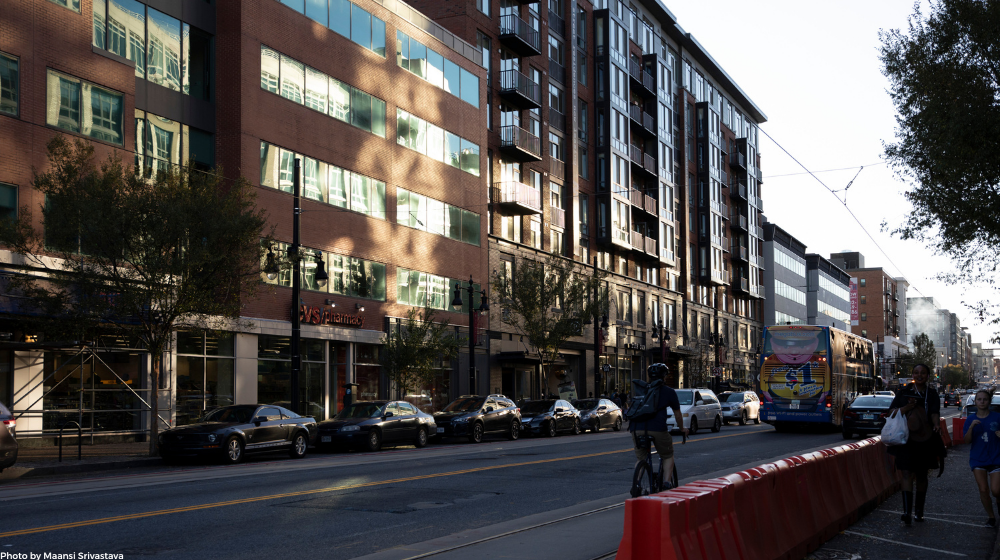
But while Littlejohn’s case may have run its course nearly four decades ago, PCP’s presence in DC’s criminal justice system remains despite the fact that, according to national statistics from the Center for Behavioral Health Statistics and Quality (CBHSQ), in 2015 only 2.4 percent of people aged 12 or older have used PCP in their lifetime.
“It’s very unique to DC and a couple other parts of the country,” said Dr. Regina LaBelle, program director of the Addiction and Public Policy Initiative at the O’Neill Institute for National and Global Health Law at Georgetown Law.
PCP, which belongs to the dissociative category of hallucinogens, can cause users to feel disconnected from their environment and even their own bodies, according to a National Institute on Drug Abuse (NIDA) report. It was developed as an anesthetic in the 1950s, only to get discontinued and emerge as a street drug in the 1960s.
PCP in the DC Courts
One hundred and seventy-one of the defendants who were brought before judges at the DC Superior Court for initial hearings from June 16 to Oct. 16, 2020, had a controlled substance charge filed against them, according to D.C. Witness data. Thirty-two of them picked up a PCP-involved charge. That’s about 18 percent.
PCP was the second most common drug with which people were charged during this time. Only cocaine showed up more often.
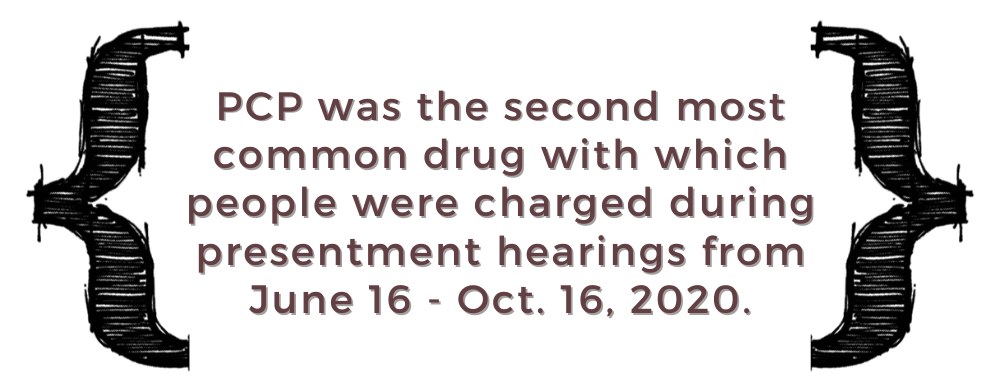
Twenty-five of the defendants were charged in felony cases.
Seven were charged in misdemeanor cases. Two of the felony cases – one involving an unlawful possession of liquid PCP charge and the other involving a possession of a controlled substance charge – have been dismissed by prosecutors. Aside from one defendant whose case status D.C. Witness could not verify, the others’ cases remain open.
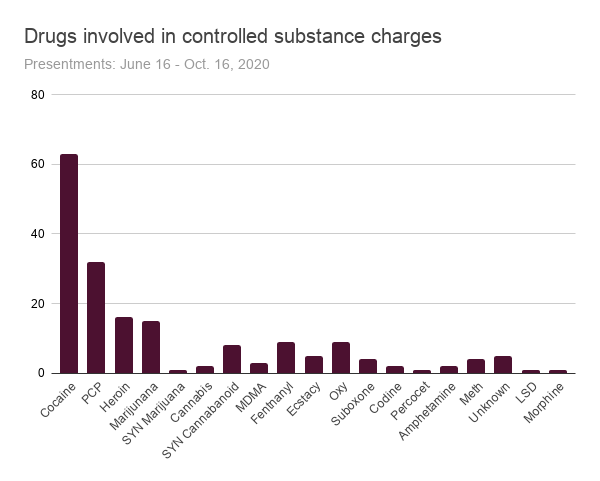
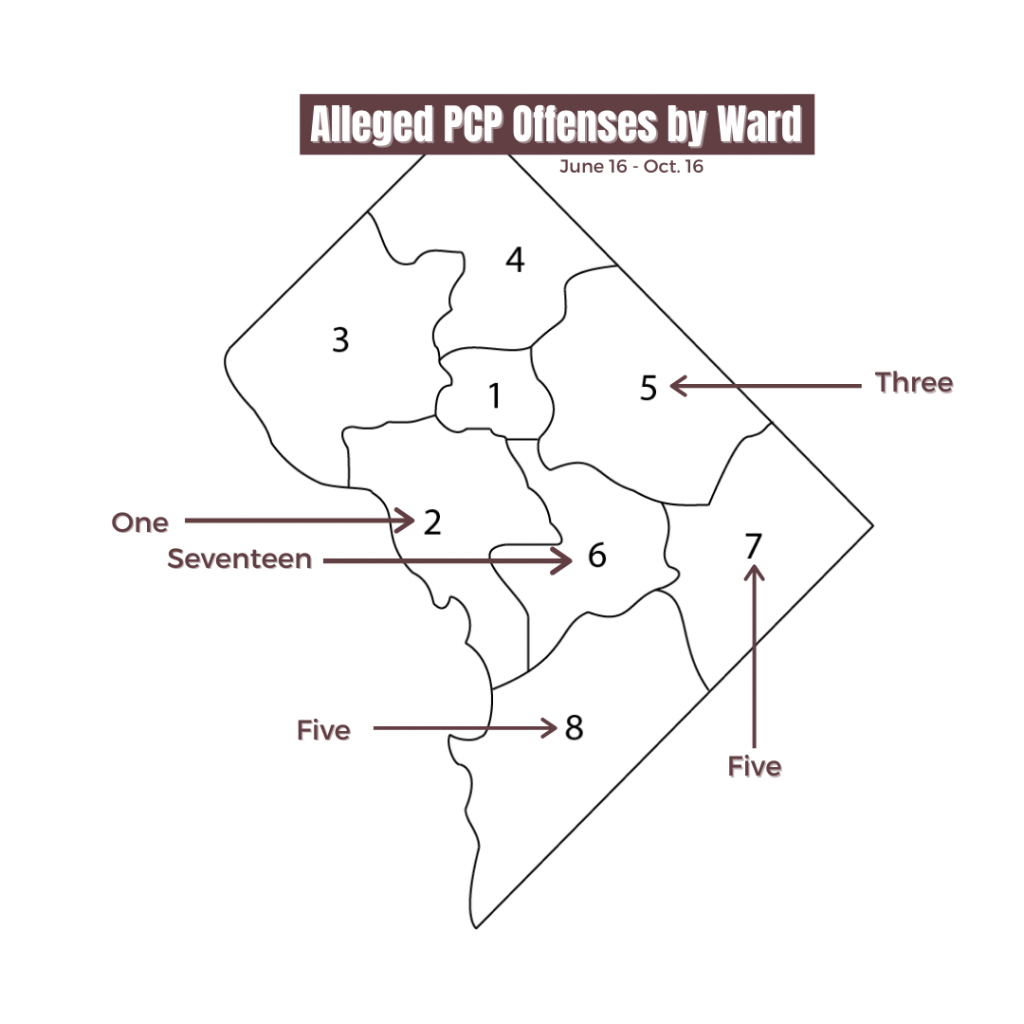
Most of the alleged offenses happened in Ward 6.
The average age of the defendants was 41 years-old. Their ages ranged from 28 years-old to 64 years-old, data shows. This is excluding six defendants, whose dates of birth could not be found.
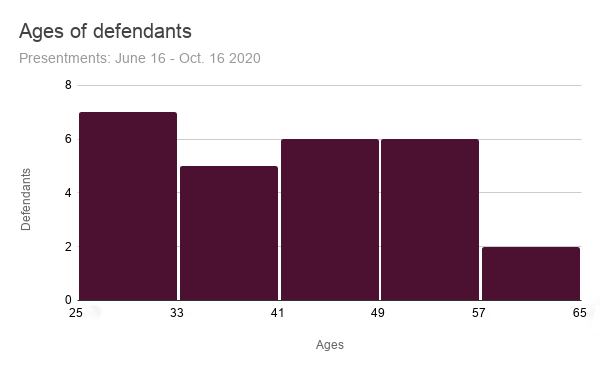
“It seems that a lot of these drugs are recycled from one generation to the next,” said Dr. Edwin Chapman, who has spent over four decades practicing in DC with a specialization in internal medicine and addiction medicine. “They may appear for a time, and then, for some reason, become out of vogue, and then show up again.”
There are several types of charges related to controlled substances, and some of these defendants were charged with more than one of them related to PCP.
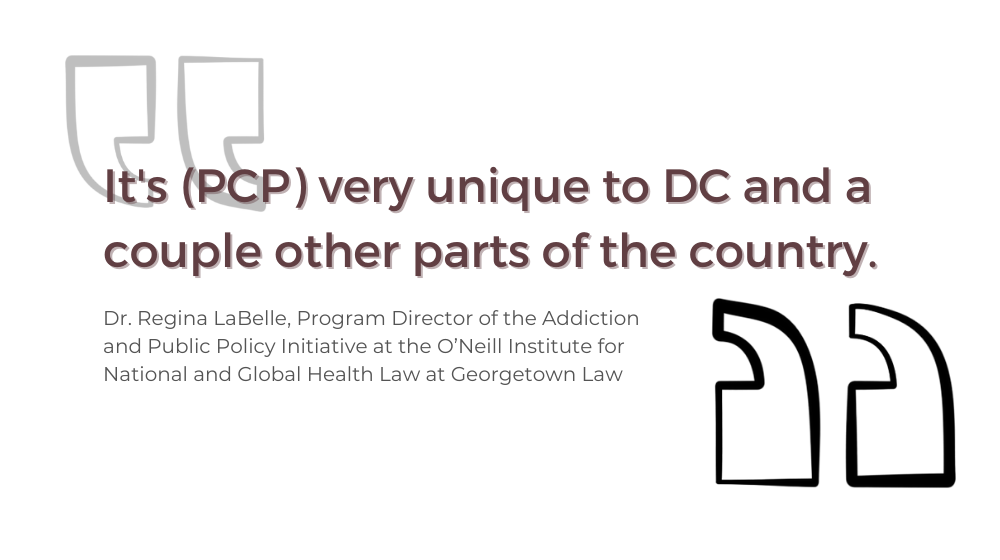
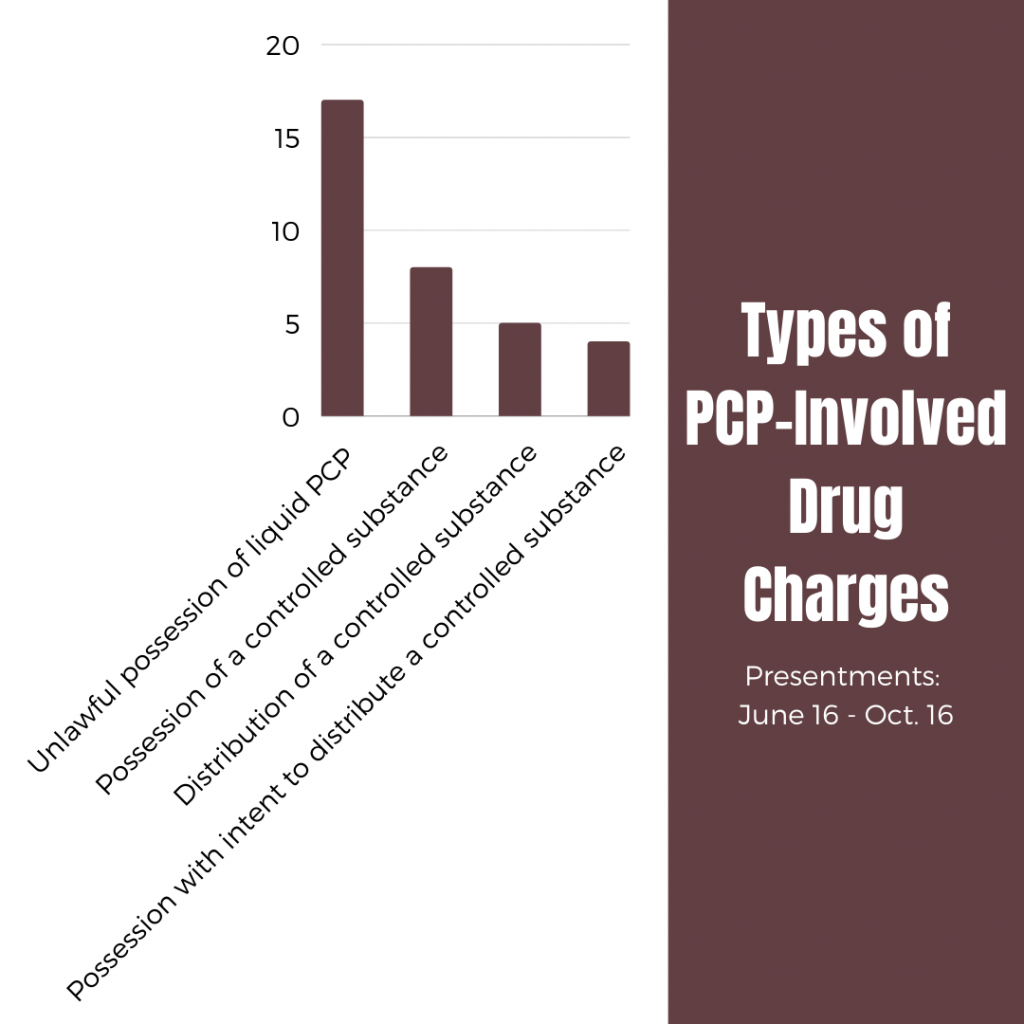
The most common PCP charge in these cases was unlawful possession of liquid PCP. Over half of the defendants picked it up. The charge is a felony in DC and has been since 2010.
“This was legislation enacted by the DC City Council in efforts to stop the flow and use of liquid PCP in the city,” said Commander Haines.
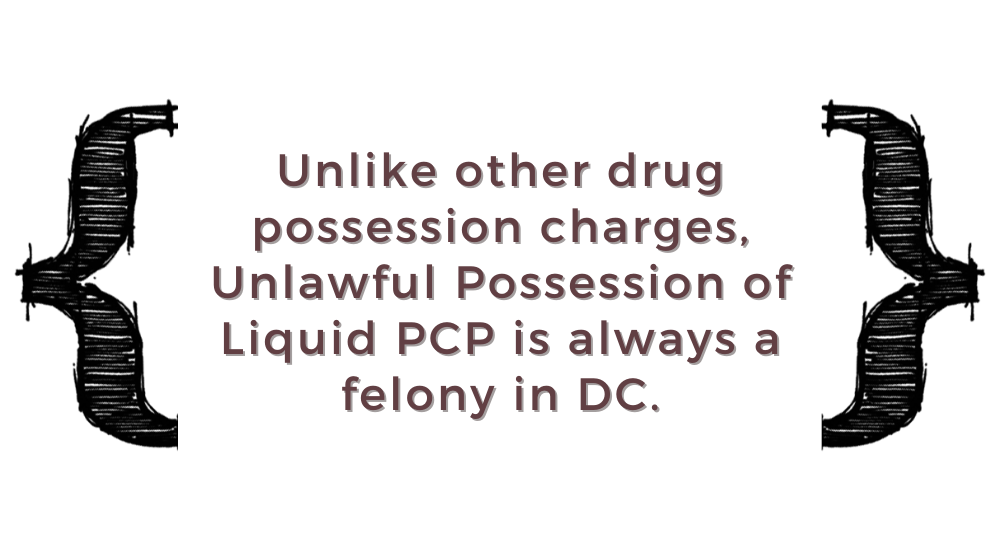
From June 16 – Oct. 16, 2020, eight defendants were charged with possession of a controlled substance. Nine were charged with either possession with intent to distribute or distribution of a controlled substance.
“We do see PCP, particularly among the homeless population,” said Dr. Chapman. “It’s cheap. I think that’s probably the key component, the fact that it’s a relatively cheap buy.”
A 2001 study from the National Drug Intelligence Center estimated a PCP-laced cigarette or joint to cost around $5-$30. The study estimated that a gram of powder or single tablet costs between $20-$30. Finally, the study estimated the drug to cost $125-$600 per ounce in liquid form.
According to D.C. Witness research, one of the 32 defendants was listed as having no fixed address in court documents. Another defendant’s court document had nothing listed for his address.
But even if a defendant is not charged with a drug offense, allegations of drug use may still be relevant to their case.

That 2015 homicide case opened when Robert Paris was charged with second-degree murder while armed for allegedly striking and killing 32-year-old Tomika Early with his pick-up truck while she was changing a flat tire at the intersection of Suitland Parkway and Stanton Road, SE on July 14.
Police said he had been drinking at the time of the homicide. Not long after, the prosecution said that Paris, who was 52 years old at the time, tested positive for PCP when he was arrested.
Paris pleaded out on charges of voluntary manslaughter and driving under the influence. He was sentenced to serve 10 years for the manslaughter charge plus five months for the DUI.
During his sentencing hearing, an apologetic Paris said he would take Early’s place if he could, The Washington Post reported.
“Because of the behaviors associated with PCP, they [users] definitely have a tendency to end up in the criminal justice system,” said Dr. Chapman.
Sean Thompson-El, a rehabilitation specialist at mental health nonprofit Community Connections, Inc., has seen a lot of PCP throughout his career.
“It just amazed me because that drug is just too strong and too dangerous that people still experiment with it,” he said.
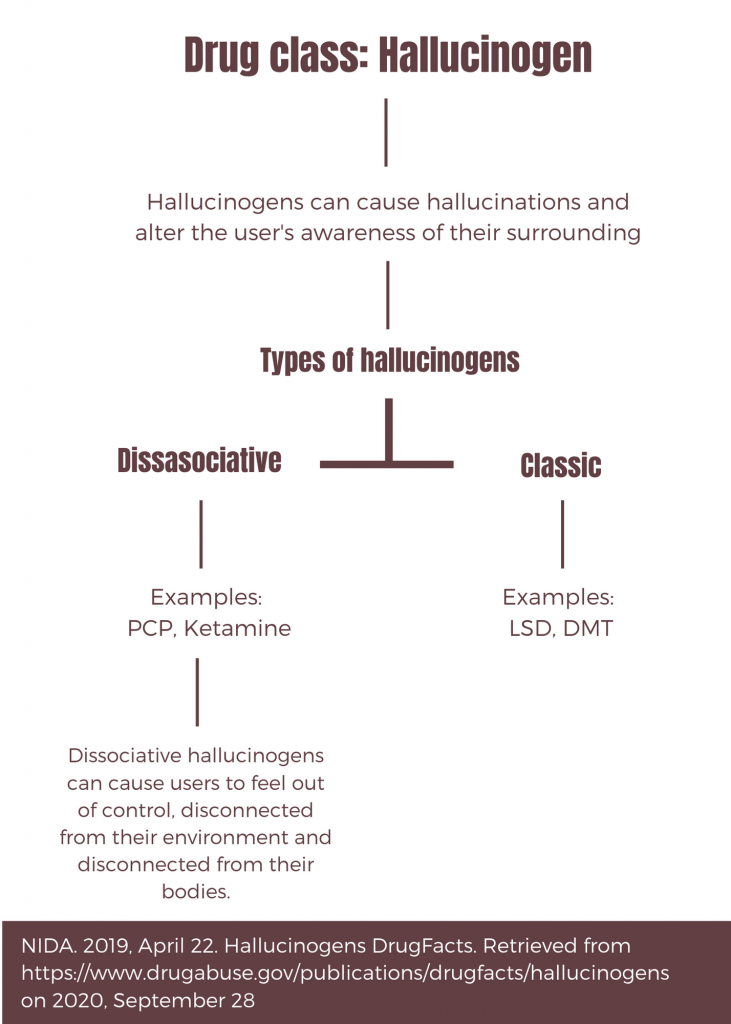
Symptoms of short-term use can include delusions and hallucinations, according to a 2016 Surgeon General report. Consequences of long-term use can include problems with speech, thinking and memory. The drug has also been linked to self-injury.
“Large doses may cause you to be very suspicious and not trust others,” an article published by the U.S. National Library of Medicine states. “You might even hear voices that are not there. As a result, you may act strangely or become aggressive and violent.”
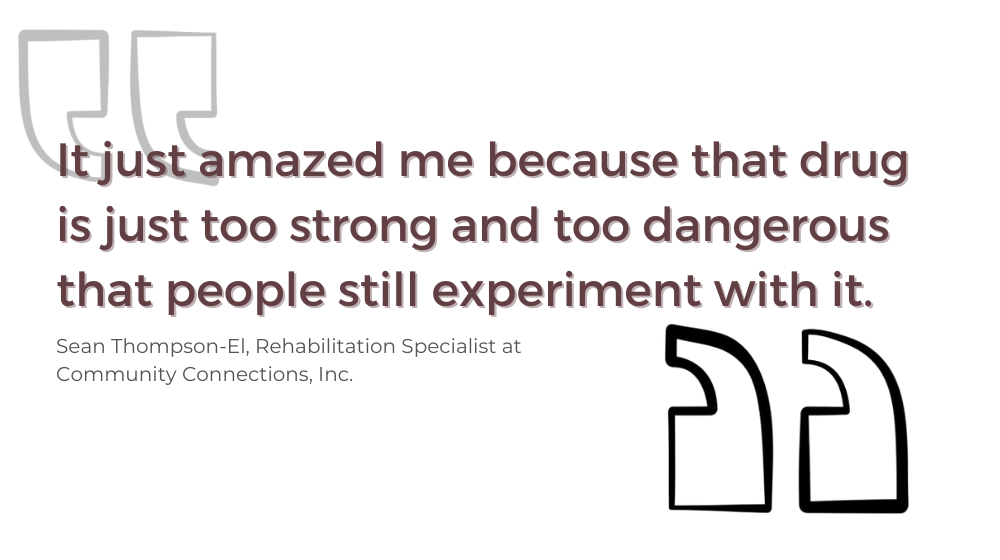
Substance Abuse Treatment
A 2020 report prepared by the criminal justice reform nonprofit Council for Court Excellence (CCE) on behalf of the Office of the DC Auditor shed light on how substance abuse problems are addressed for DC’s criminal defendants.
The report states that “only a tiny fraction (just over 1 percent) of the incarcerations associated with substance use disorder (SUD) in the 4,602 cases analyzed by CCE received SUD services before, during, and after incarceration.”
The report also found that it took an average of 33 days to connect people, who have been arrested for substance abuse crimes, to treatment options once they were released.
A report by the U.S. Department of Health and Human Services stated, during 2015 – 2017, 11.7 percent of people aged 12 and older in DC had an SUD in the past year, which is higher than the national average of 7.5 percent.
Some people who find themselves in trouble with the law may have alternative options available to them, including the Superior Court Drug Intervention Program. It’s more commonly known as drug court.
Diversion opportunities for people in the drug court include Deferred Prosecution Agreements (DPA) and Deferred Sentencing Agreements (DSA.) Felony defendants in these courts can receive an Amended Sentencing Agreement (ASA), which allows their charges to be reduced to misdemeanors if they successfully complete certain requirements.
Defendants with PCP-involved cases from mid-June to mid-October have not received sentences, and two case have been dismissed, according to D.C. Witness data.
“The problem is that when you see various drugs showing up – like PCP, or amphetamines, or cocaine or opioids – you’re really dealing with an underlying community problem that has to do with anxiety and depression,” Dr. Chapman said. “And that anxiety and depression seems to correlate with economic depression. So I look at these drugs, not necessarily as individual drugs but as a symptom of something larger that’s going on in the community.”
Andrea Keckley and Maansi Srivastava wrote this article.
Follow this case